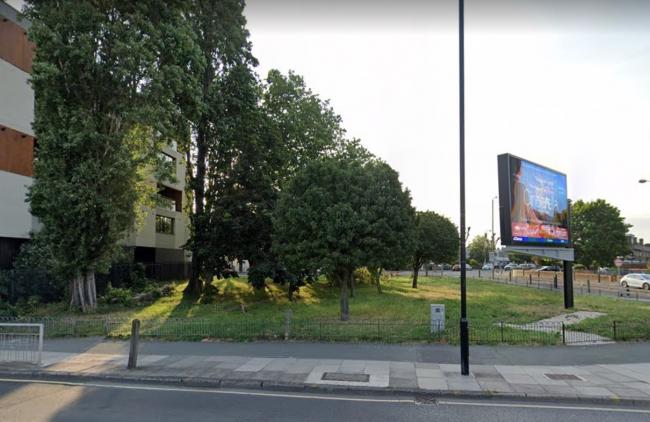
Dear Greenwich Council,
Greenwich Council has given notice of its intention to sell the public open green space known as the Rose Garden, situated at Blackwall Lane London, SE10 0SP on Greenwich Peninsula.
Greenwich and Bexley Green Party strongly oppose the sale of the Rose Garden.
Disposing of this green space is inconsistent with the Council’s stated ambitions to safeguard residents’ wellbeing, improve air quality and address the climate emergency.
Selling green spaces is an attack on wellbeing.
Access to nature is fundamental to human prosperity. To dispose of the Rose Garden would negatively impact residents’ wellbeing in this regard.
Numerous academic studies have shown that lack of connection with nature is detrimental to mental health and furthermore serves only to undermine political buy-in for improvements to nature stewardship.
In a city environment, local parks are a lifeline not only for wildlife but also for residents.
Consider those under lockdown conditions recently in overcrowded households or living with mental health conditions. The ability to escape for exercise or personal space to a local area of greenery is not optional for such persons, it is essential.
These wellbeing considerations are fully recognised in the London Plan.
Disposing of the Rose Garden would violate London Plan policy G3 (Creating a healthy city) which instructs those involved in planning and development to assess the potential impacts of proposals on the mental and physical health and wellbeing of communities.
Additionally, selling the Rose Garden for development will further deplete the area around Tunnel Avenue which is already deficient in availability of green spaces.
Note that according to the council’s own assessments, Greenwich Peninsula is identified in “Towards a Greener Royal Greenwich – Green Infrastructure Study 2017” as one of the areas in the borough having the greatest deficiency in access to a range of open spaces.
The Royal Greenwich Core Strategy also includes a map of areas of open space deficiency (Figure 5) and access to wildlife deficiency (Figure 6) and this site falls into both.
The plan to dispose of the Rose Garden therefore also violates London Plan Policy G4 (Open space) which insists boroughs have a responsibility to identify areas of open space deficiency and include designations and policies in local plans to protect it, particularly to meet needs and address deficiencies.
Removing mature trees degrades air quality.
The Rose Garden has 4 large native trees which are at least 40 years old, plus 7 other mature healthy trees. These act as a carbon sink and contribute to air quality by removing particulates and nitrogen gases.
It is deeply disappointing to see Greenwich Council prepared to sacrifice mature trees, especially in the context of other city councils planning to massively increase tree cover, e.g.:
- Hackney Council has plans to double on-street canopy cover to 40% and plant 30,000 trees in parks and green spaces.
- Bristol City Council committed to double tree canopy cover by 2045 as part its One City Plan.
- Leeds City Council approved a report calling on tree canopy cover to be almost doubled across the local authority area.
- Oxford City Council has publicly supported doubling tree cover across Oxfordshire.
Scrapping public open spaces such as the Rose Garden implies that mature trees can be simply replaced with young saplings elsewhere. This is not the case.
Mature trees are far more effective than saplings at improving air quality. Moreover, newly planted trees are all too frequently mismanaged and literally left to wither.
Again, this is recognised in the council’s own plans. Core Strategy policy OS(f) (Ecological factors) sets a presumption for the retention of mature trees and the protection and enhancement of natural and ecological features.
Supporting paragraph 4.3.35 recognises that, as well as ecological and aesthetic value, trees are important for air quality and mitigating and adapting to climate change.
Nature does not respond to one in, one out accounting and its stewardship must be taken more seriously by the council.
Finally, we note that the nearby Christchurch Primary School has a community garden and forest which benefits from ecological synergies with the Rose Garden. It is obvious to any ecological view of the world that harm to one area of green space has knock-on effects to other connected green spaces. Such externalities include established trees and wildlife dying.
We demand proof of regulatory compliance.
We demand to see the evidence that the council has considered the relevant strategies and policies in making this proposal.
In our view, selling the Rose Garden is inconsistent with planning frameworks at national level, at London level, and at council level.
At national level, the National Planning Policy Framework states that existing green open spaces should not be developed unless an assessment shows that the land is surplus to requirements.
At London level, the Mayor of London sets objectives for green infrastructure across London, which include criteria upon which selling the Rose Garden would violate such as:
- Promoting mental and physical health and wellbeing;
- Adapting to the impacts of climate change and the urban heat island effect;
- Supporting learning about the environment; and
- Conserving and enhancing biodiversity and ecological resilience.
At council level, the Royal Greenwich Core Strategy policy H(c) (Backland and infill development) sets clear criteria when considering a site for development and the potential loss of the site as amenity space for the local community.
Supporting paragraph 4.1.45 states that development should only be allowed where it will not adversely affect the local environment, where it will not lead to over-development, and where residential amenity space shall be maintained.
In summary, we believe that for Greenwich Council to be selling the Rose Garden is not only irresponsible but contrary to its planning strategies at every level of government.
The plan to dispose of the land must be withdrawn as a matter of urgency.